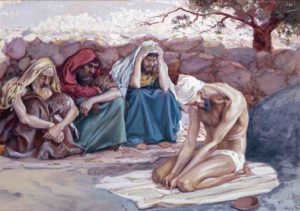Call to faith in a suffering world
To what extent does the appealing to faith of Habakkuk taken up by the author of Hebrews concern us today? Is it a drama of history, an uneven clash between two civilizations of the distant antiquity, a conflict of values for a Christian church confronted with the 1st century pagan world? Dramas and conflicts of values continue for centuries and are far from ceasing in this suffering world.
These texts can also speak to us more personally: these tragic situations, the biblical authors did not only describe them, they were also subjected to them with those who suffered.
Suffering, but faith and hope
In all the horror of his drama, we can say this world has stuck to the skin of Habakkuk even wringing from him cries of misunderstanding, of distress. No, God does not reject the cries of his children when they pour out their complaints before him. No, he does not require an impassive, lifeless faith which would claim to be inaccessible to suffering. Habakkuk has certainly suffered from misunderstanding: who changed his behavior while listening to his prophecy, who chose faith, fidelity to God despite what would happen? Some perhaps did, certainly not a majority. He suffered because he was the first to know everything that was to happen. Others imagined that they would escape without difficulty. He knew that the invasion and the destruction were to be inevitable and he himself would not escape. He questions God, but never charges him. Cries of suffering but above all cries of faith and hope that resonate in the face of all the despair, of all the cowardice and of all compromises, a cry that stirs up: “The righteous shall live by faith”!
The Christian shows solidarity in a suffering world
Habakkuk may help to place oneself as a Christian who lives the experiences of others in the world. Being a Christian does not automatically guarantee to escape the problems and misfortunes of life. The Christian in the world, is also part of those who can undergo, who undergo economic crises, epidemics, wars, tsunamis, earthquakes, although some are occasionally protected providentially. All these disasters, all these sufferings are cries for help we have the duty to respond to. No, Christian life is not a safe island … The Christian does not sit in a train traveling to the beyond, ignoring the world crisis he is crossing! Disassociating oneself from those who suffer, classifying them in the “unconverted” category to deny them help, is outrageous. Let us be attentive to the needs of material support, of solidarity close to us and far away. At least we can pray, say a word of encouragement, we can also engage in practical action. There are plenty of Christian and other charities where we have to take our part.
A long-term look
He also calls for repentance, but this call is not only aimed at others, at those who do not know God and need to turn to him. Call to repentance, to vigilance, appealing everyone, me too, if I am not faithful in my hope, if I faint in my faith because God has not answered it according to my ideas and expectations.
Beyond the immediate Habakkuk looks at the long term. God’s justice will be carried out sooner or later. He made a choice which binds him: to rejoice in the Lord, to praise God rather than to complain.
Though the fig tree does not bud and there are no grapes on the vines, though the olive crop fails and the fields produce no food, though there are no sheep in the pen, and no cattle in the stalls, yet I will rejoice in the Lord, I will be joyful in God my Savior. Habakkuk 3.17-18.
The letter to the Hebrews, a narrow path between two temptations
And Hebrews? What was its direct impact? Did the Judeo-Christians of Rome all waive their temptation of going back to conformism, to Judaism? And did others not continue holing up at home, in their house churches … in order to escape a too difficult confrontation with the surrounding world? A narrow, difficult path, a tightrope stretched between two temptations.
Conformism
The first temptation is to return to Judaism, a value yet recognized in the Roman society of the time, choosing a comfortable option, in order not to get into trouble, at least temporarily. Dilution, drowning in the mass of “isms” … (Put what you want before -ism) or changing the-ism without changing the life … from paganism to the majority Christianity of Constantine and Clovis … We are born in an –ism, we stay there and die there without even asking why.
Compliance with the pluralist, majority values of the present world! They say now much less “My only belief is in the progress of humanity” But rather, “Take a pinch of Christian spirituality here and of Hindu there, add a little esoteric, dilute in a small sauce of religious practice … ”
Isolation
The second temptation is isolation, the ghetto. Only associate with Christians of the same group as yours. Do not talk to anyone except to tell him evangelistic verses. Deny all social life … It’s a caricature, it is rarely seen, fortunately, but it also exists.
Which model for the Christian?
Dilution, no! Isolation, not either! Then testimony with all available means? First to get involved in social lasting, sincere and friendly relations with the people around us in the neighborhood, in the village, in the town. Then to firmly lay the foundations of the Christian faith: incarnation, death and resurrection of Christ first of all. To know why we are Christian. … Then go deeper… To be able to explain this faith in a clear, natural language. This helps to have a real, active, inventive testimony, which binds for a long time, which respects the person. The idols of pluralism do not stand before the cross of Christ, but it often takes long hours of patience and friendship for people to admit it. And years can sometimes pass without apparent change. Who will take the risk to move forward on the tightrope over? The Christian Church surely, but through each of us, through me first.
C.S.



